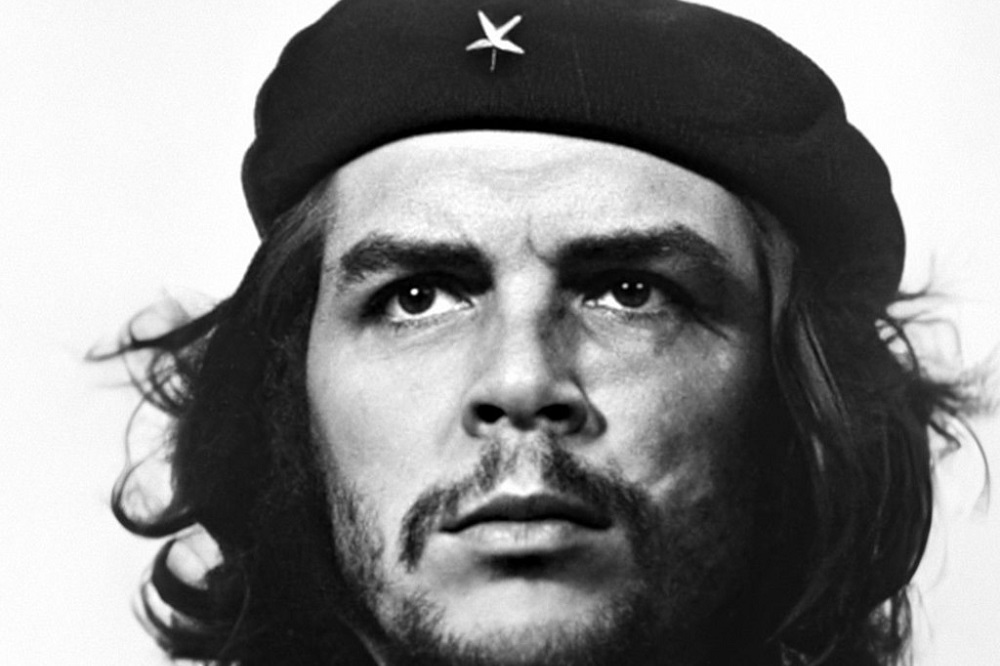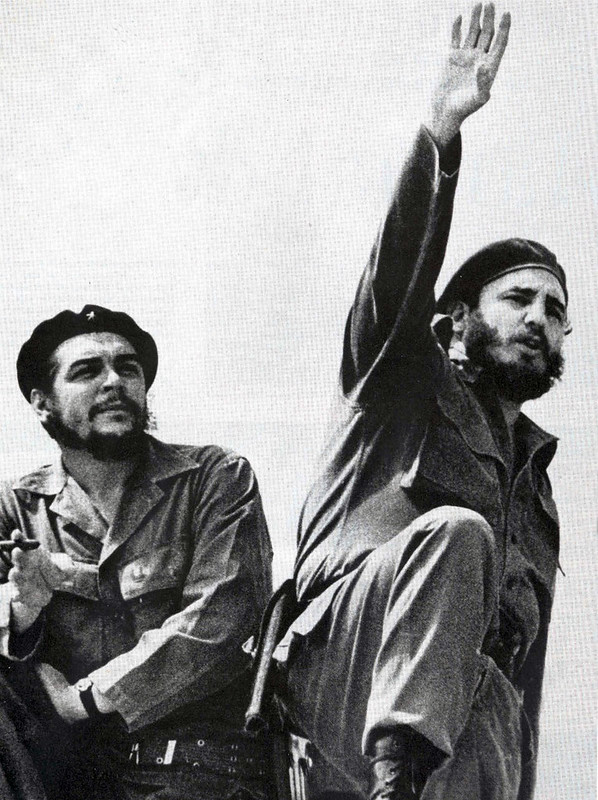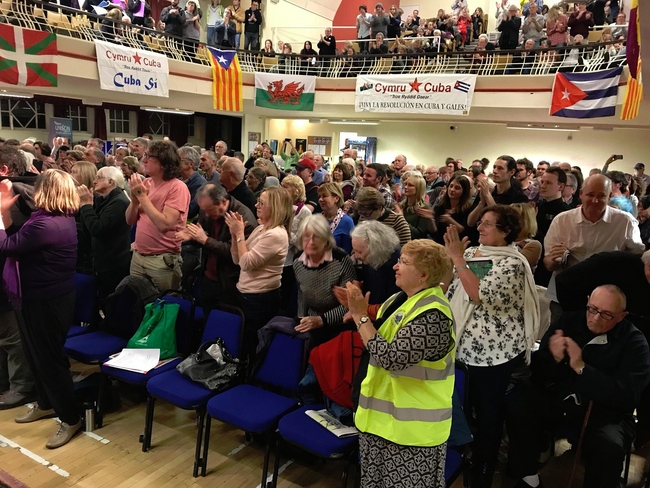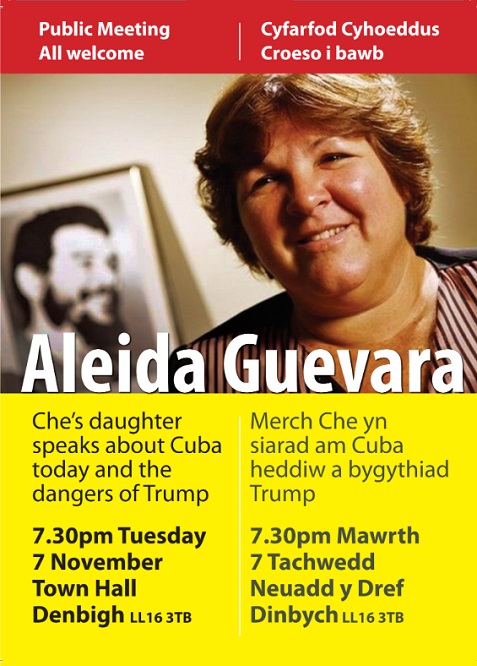Viva la revolución: Che Guevara’s surprising Welsh connections

Christopher Evans
Solidarity, or solidaridad in Spanish, is a loaded word. It is a word affiliated with unity, defiance and the need for change. It is also a word forever associated with the iconic revolutionary Ernesto ‘Che’ Guevara. It may come as a surprise that the famous Argentine, who was murdered by the CIA-funded Bolivian army on 9 October 1967, has some links to Wales.
An internationalist, Che fought against repression and for human rights and equality throughout the world. Influenced by the poverty, deprivation, and injustices that he witnessed on his motorcycle travels through South America with his friend Alberto Granado (if you haven’t read or watched The Motorcycle Diaries, do!), Che dedicated the rest of his life to fighting against inequality.

After years of hiding in the mountain jungles of Cuba’s Sierra Maestra and using guerrilla warfare tactics, Fidel Castro, Che, and their rebels, would eventually be successful in overthrowing the military dictator Fulgencio Batista in 1959.
The Cuban Revolution had begun.
Owain Glyndŵr
In his 2003 book ‘The Psychology of Distance: Wales: One Nation’, Professor Phil Williams states that it is “not coincidence that one of the first acknowledged guerrilla leaders in history was Owain Glyndŵr, and his first major victory was at Hyddgen, near Pumlimon’ (a mountainous region, where Glyndŵr’s army used guerrilla warfare tactics to overcome the more numerous English invaders at The Battle of Mynydd Hyddgen, in 1401).
Williams goes on to write that “Che Guevara was inspired by Owain Glyndŵr, and it is claimed that Fidel Castro kept a book on Glyndŵr on the shelves in his study.”
Emrys Roberts corroborates with this, stating in his book ‘Highlights from Welsh History’ (2017) that Owain Glyndŵr reverted to the “more traditional method of guerrilla fighting – indeed, Fidel Castro of Cuba regarded him as the first effective guerrilla leader of the last two millennia, and Castro copied many of Glyndŵr’s methods.”
Che also ventured through Patagonia on his travels, known for its Welsh settlers in the cities of Puerto Madryn and Trelew, and the town of Gaiman. He was also a huge rugby enthusiast. The young Guevara was a talented and tough-tackling player, despite being famously plagued with chronic asthma.
According to a 2007 Guardian article, whilst studying medicine in Buenos Aires, Che even started publishing a rugby magazine in 1951 entitled ‘Tackle’. It lasted for 11 editions, before General Peron’s police paid a visit to Che. They accused him of spreading communist propaganda after he used his column in the magazine to criticise the class structure within the game, which was then reserved for Argentina’s privileged elite.
Physician
In 1953, Che Guevara qualified as a physician, specialising in dermatology (he was an expert on leprosy). He would not practice for long, instead deciding to follow his political convictions.
His daughter, Dr Aleida Guevara, has followed in her father’s footsteps. Not just as a doctor (Aleida is a paediatrician at the William Soler Children’s Hospital in Havana), but also as an activist for social and human rights.
Aleida graduated in Nicaragua, and like many doctors from Cuba, has travelled all over the world to help others as part of the Cuban medical mission that was set up after the revolution. Aleida spent time in Ecuador, as well as two years in Angola.
The medical internationalist program regularly sends Cuban doctors oversees to help those in need. This was most recently evident during the pandemic, where 52 Cuban doctors travelled to Italy in March 2020 to support the badly affected region of Lombardy.
Speaking to Reuters before flying, Leonardo Fernandez, an intensive care specialist, said: “We are all afraid, but we have a revolutionary duty to fulfil, so we take out fear and put it to one side. He who says he is not afraid is a superhero, but we are not superheroes, we are revolutionary doctors.” Cuba would also send over 200 doctors to South Africa in the fight against Coronavirus.
Denbigh Town Hall
In November 2017, Aleida Guevara did something her much-travelled father never did. As part of a UK tour commemorating 50 years since her father was brutally murdered, Aleida visited Wales to give a talk at Denbigh Town Hall. Organised by the Cuba Solidarity Campaign and their Welsh branch Cymru Cuba, the free tickets for the 400-capacity venue sold out instantly, with contributions given toward the Hurricane Irma Appeal to help those who had been affected in Cuba.

Aleida’s visit was recorded for a short film produced by Llinos Griffin. In a brilliant interview, Aleida discusses topics ranging from sexism, racism, education, internationalism, and the NHS. Despite being five years ago, Aleida’s words ring true now more than ever.
“The UK in general has had huge success in its health system, and unfortunately in the last few years they have lost it because they are privatising everything. This is incredible backwardness. Because it is a country where its health system was really one of the best. It was one of the first countries to develop nursing, and fighting sepsis within affected hospitals. A real scientific development. And at the same time, they developed a truly human scheme to give free healthcare for all. How can they lose that?”
The altruistic and erudite Guevara, who also helps run homes for disabled children and refugee children with domestic problems in Cuba, despairs at the privatisation of education and health.
“In Cuba, the education system is free, of course, because if we want doctors and professionals, everyone should be able to aim for that, shouldn’t they? It’s a human right. Health and education come hand in hand. You can’t commercialise these things. If we want to be one of the most ‘useful’ people in the world, we have to be an educated country, who won’t be manipulated, who won’t be deceived, and who won’t allow ourselves to be used as a third party.
Cultured
“And for that to happen we need to be cultured. José Martí, the national hero poet of Cuba and apostle of the Revolution, always said that for a country to be free, it must be cultured. Since the beginning of the Revolution, they’ve strived for this aspect.”
Guevara speaks of the importance of unity and again returns to that word – solidarity.
“Solidarity is the best expression of people’s kindness and tenderness, but it also makes us better human beings. Learning about differences that can be useful for going about daily business to improve our own lives. That is always a good thing.
“Solidarity isn’t just good for those who receive it, it’s also good for those who practice it. I’m telling you it because I have first-hand experience of it myself. It makes us grow as human beings. It makes us better people. I believe that here in Wales, the UK in general, in Europe, those who show solidarity with Cuba are capable of seeing other people’s virtues. It means that they have it within them. And it’s a good thing for the whole world.”

It was Guevara’s first visit to Wales, though she said that she had learnt about the country through reading novels about the perilous lives of the Welsh miners.
At the event in Denbigh, she was presented with a piece of north Walian slate with the words of Welsh pacifist poet Waldo Williams engraved upon it: “Daw dydd y bydd mawr y rhai bychain Daw dydd ni bydd mwy y rhai mawr” (Cometh the day when the powerless have power, Cometh the day when the powerful shall be no more).
Listening to Dr Guevara is inspiring. She is an incredible person. Like her father, she is a doctor, activist and socialist, who is fighting for a better world.
We can look closer to home for further inspiration when thinking about the NHS, what it has done for us, and what it will hopefully continue to do for us. That is from the man who created it, Aneurin Bevan.
“Illness is neither an indulgence for which people have to pay, nor an offence for which they should be penalised, but a misfortune, the cost of which should be shared by the community.”
Solidarity with the NHS and its workers.
A special thanks must go to Llinos Griffin at Gwefus for allowing quotes to be used from her brilliant film of Aleida Guevara’s visit to Wales. Also, to Sel Williams for all of his help.
Support our Nation today
For the price of a cup of coffee a month you can help us create an independent, not-for-profit, national news service for the people of Wales, by the people of Wales.





Indeed, Social healthcare is the greatest single venture in Human History that needs protecting. If one is expected to fight for one’s nations should it be invaded, if one is expected to pay taxes, Educate the next generation, Care for the elderly, Etc. They should be safe in the knowledge that if something happens to them, they won’t need to beg for something that should be a Human right. The Privatisation of The NHS is a kin to War profiteering, only worse because you are taken advantage of people at a time when they are most in need of Help.
Excellent piece. There is so much to link our nations. The first time I went to Cuba the hotel receptionist asked me questions about Owain Glyndwr. Another man, who worked in the market, said he had read about the Merthyr Rising when he was at school. They knew more about our history than many of our own people.
Che’s grandmother was Irish and he told Maureen O’Hara that all he knew about gorilla warfare he had learned on her knee. The blood of Irish rebels flowed in his veins.